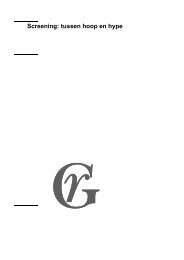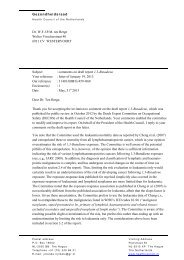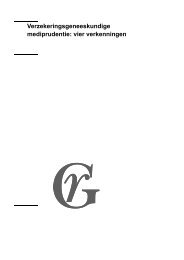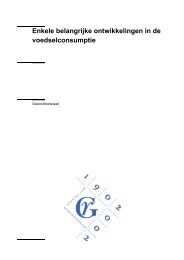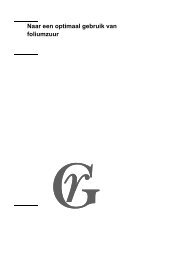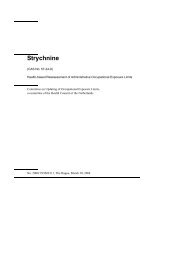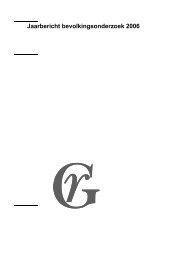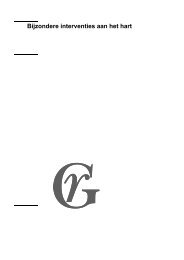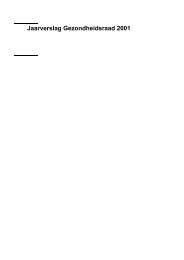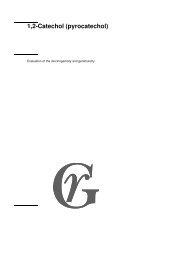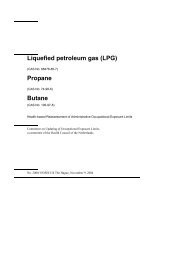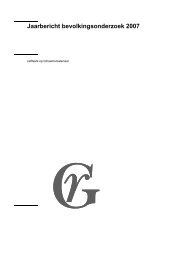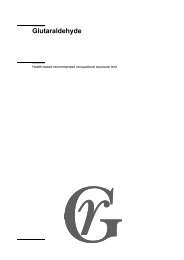Health Council of the Netherlands Reports 2003 - Gezondheidsraad
Health Council of the Netherlands Reports 2003 - Gezondheidsraad
Health Council of the Netherlands Reports 2003 - Gezondheidsraad
Create successful ePaper yourself
Turn your PDF publications into a flip-book with our unique Google optimized e-Paper software.
Dutch Boxing Association <strong>the</strong>refore prohibit a contest from taking place without<br />
a ringside physician. The Ne<strong>the</strong>rlands Association <strong>of</strong> Sports Medicine (ASM)<br />
has issued a guideline regarding boxing and o<strong>the</strong>r fighting sports: physicians<br />
should endeavour to establish preventive measures and by no means promote<br />
<strong>the</strong>se sports activities. The Royal Dutch Medical Association has ruled that all<br />
physicians in <strong>the</strong> Ne<strong>the</strong>rlands are to observe <strong>the</strong> ASM guidelines.<br />
The prevention <strong>of</strong> brain injury in soccer<br />
Whenever brain injury is suspected, <strong>the</strong> Committee would like to see <strong>the</strong><br />
guidelines developed by <strong>the</strong> American Academy <strong>of</strong> Neurology applied. The<br />
additional and more specific advice given by <strong>the</strong> International Conference on<br />
Concussion in Sports ought to be followed in <strong>the</strong> Dutch sports setting because <strong>of</strong><br />
<strong>the</strong> detailed step-by-step plan for a sportsperson’s return to play following a brain<br />
injury. Appropriate care following brain injury can prevent aggravation <strong>of</strong> <strong>the</strong><br />
damage.<br />
On-site provision should be made for <strong>the</strong> medical treatment <strong>of</strong> acute brain<br />
injury. Such provision is already made for all pr<strong>of</strong>essional matches in <strong>the</strong><br />
Ne<strong>the</strong>rlands. The medical personnel in attendance are all given instructions by<br />
<strong>the</strong> Royal Ne<strong>the</strong>rlands Football Association on how to respond in <strong>the</strong> event <strong>of</strong> a<br />
(suspected) brain injury. The Committee believes that compliance with <strong>the</strong>se<br />
instructions should be mandatory. Amateur matches are too numerous to make<br />
<strong>the</strong> universal attendance <strong>of</strong> trained medical personnel practical. In <strong>the</strong> United<br />
States, an easy-to-use reference card has been developed, which lists signs and<br />
symptoms <strong>of</strong> concussion and sets out a number <strong>of</strong> simple but validated on-<strong>the</strong>spot<br />
tests that can be used to assess <strong>the</strong> condition <strong>of</strong> someone who has received a<br />
blow to <strong>the</strong> head. The Committee recommends <strong>the</strong> development <strong>of</strong> a Dutch<br />
version <strong>of</strong> this reference card for on-field use in both pr<strong>of</strong>essional and amateur<br />
sport. All referees and coaches should <strong>the</strong>n be instructed, at least at <strong>the</strong> beginning<br />
<strong>of</strong> each season, in <strong>the</strong> use <strong>of</strong> <strong>the</strong> card. Wherever doubt exists regarding a player’s<br />
fitness to continue following an incident, he or she should be withdrawn from <strong>the</strong><br />
match and referred for medical examination. The Committee also recommends<br />
that pr<strong>of</strong>essional players should undergo both an immediate on-field test, plus<br />
more thorough subsequent testing.<br />
In <strong>the</strong> interests <strong>of</strong> brain injury prevention, strict enforcement <strong>of</strong> <strong>the</strong> rules <strong>of</strong><br />
<strong>the</strong> game is also important. As well as advocating such enforcement, <strong>the</strong><br />
Committee would like to see <strong>the</strong> rules modified in two respects. The FIFA is<br />
already seeking to outlaw use <strong>of</strong> <strong>the</strong> elbow when jumping to head <strong>the</strong> ball. The<br />
Committee’s view is that use <strong>of</strong> an elbow should be outlawed in all phases <strong>of</strong><br />
14 <strong>Health</strong> <strong>Council</strong> <strong>of</strong> <strong>the</strong> Ne<strong>the</strong>rlands; <strong>Reports</strong> <strong>2003</strong>



